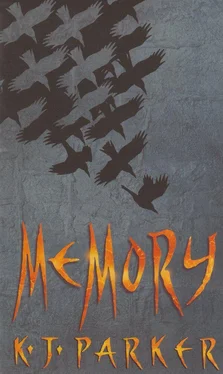K Parker - Memory
Здесь есть возможность читать онлайн «K Parker - Memory» весь текст электронной книги совершенно бесплатно (целиком полную версию без сокращений). В некоторых случаях можно слушать аудио, скачать через торрент в формате fb2 и присутствует краткое содержание. Жанр: Фэнтези, на английском языке. Описание произведения, (предисловие) а так же отзывы посетителей доступны на портале библиотеки ЛибКат.
- Название:Memory
- Автор:
- Жанр:
- Год:неизвестен
- ISBN:нет данных
- Рейтинг книги:5 / 5. Голосов: 1
-
Избранное:Добавить в избранное
- Отзывы:
-
Ваша оценка:
- 100
- 1
- 2
- 3
- 4
- 5
Memory: краткое содержание, описание и аннотация
Предлагаем к чтению аннотацию, описание, краткое содержание или предисловие (зависит от того, что написал сам автор книги «Memory»). Если вы не нашли необходимую информацию о книге — напишите в комментариях, мы постараемся отыскать её.
Memory — читать онлайн бесплатно полную книгу (весь текст) целиком
Ниже представлен текст книги, разбитый по страницам. Система сохранения места последней прочитанной страницы, позволяет с удобством читать онлайн бесплатно книгу «Memory», без необходимости каждый раз заново искать на чём Вы остановились. Поставьте закладку, и сможете в любой момент перейти на страницу, на которой закончили чтение.
Интервал:
Закладка:
Then he started to grin. Precepts of religion, he thought: the best course of action is no action. They weren't going anywhere in a hurry. There was, of course, the problem of the others, the dozen or so on the other side, but he couldn't help that. If he was lucky, really lucky, the poor fools would go down into the bog to try and fish out their mates, and get stuck too. There was, after all, nothing they could do without rope (which they hadn't got), or at least if there was, then the finest military mind in the Empire was buggered if he could figure out what it was. At least some of them would try it, however; and eventually there would come a point when there weren't enough of them left unmired to get out those who were helplessly stuck, and then it'd all be over.
He frowned, doing mental arithmetic. Suppose the survivors went for help; nearest place would be the village on the far western edge of the forest, and the very earliest they could get there and get back (assuming the villagers downed tools, left their dinners on the table and ran straight out to help as soon as they arrived) was five days, more likely six. But it wasn't as straightforward as that; in order to do any good they'd need to bring tools and ropes and poles and planks, that'd mean carts or packhorses at the very least. Six days or more likely seven.
Fine, thought Feron Amathy. No further action required. Time to go home.
'Battle Slough, it's called,' said the old man, 'on account of there was a battle here once.'
Poldarn nodded. The logic was impeccable.
'Hell of a battle too, it was,' the old man said. 'One lot, they chased the other lot into the slough, they got stuck-midwinter it was, slough's mortal sticky in winter, and that's nowadays, with all the drains they dug over Winterhay taking off the worse of it-and the first lot, they just walked away and left 'em there. You can still find bones, if you look.'
Poldarn looked at him. 'What happened?' he said.
The old man shrugged. 'Oh, they all died,' he said. 'Stuck in the mud, couldn't get out. Nothing their mates could do for 'em. Oh, they went for help, but by the time they came back, they'd all died. Just stood there-well, not standing, they were all slumped over like stooks of reed, strangest thing you ever saw in your life. Makes you wonder, though, what it must've been like.'
Poldarn decided he'd like to change the subject. 'It's mostly oak here, then.'
The old man nodded. 'Some oak,' he said, 'some chestnut, but mostly oak. Damn good charcoal wood, oak. There's some as prefers beech, but it's too hot for our line of work. Oak holds the fire longer, see.'
'Seems a waste, though,' Poldarn said, without thinking. Back home (of course, he'd never once thought of it as that while he'd been there) he'd seen maybe half a dozen oak trees, no more; and even the spruces and firs were precious, as he'd found out to his cost. Curious; he'd had to leave the islands because he'd accidentally burned down a small stand of immature firs, and now here he was on his way to a charcoal camp, where on average they burned a dozen fully grown oaks a day.
The old man was looking at him. 'Why?' he asked.
'Oh, nothing,' Poldarn answered awkwardly. 'But aren't you worried you'll run out, the rate you're felling at?'
This time the old man stared at him for a moment before laughing. 'I keep forgetting,' he said, 'you're not from round here. Odd, though, you sound like you're a local boy. Leastways, most of the time you do-and I can tell an offcomer soon as he opens his mouth,' he added, with pride. Poldarn had worked out that 'offcomer' (which was probably the most offensive term in the old man's vocabulary) meant someone born out of earshot of where they were standing. 'Plenty more where these came from,' the old man went on, 'plenty more. I been felling in these woods since I was a kid, and we ain't hardly started yet.'
He made it sound like he was a man with a mission, to rid the world of the lurking threat of deciduous timber once and for all. Good luck to him, Poldarn thought, though he couldn't really bring himself to share the old fool's passion. Chopping down very big trees was too much like hard work, in his opinion. 'Well, that's all right, then,' he said. 'Is it much further? Only-'
'Nearly there,' said the old man. 'Just up over the steep and down along through.'
Poldarn nodded, wishing he hadn't asked; the old man had given him exactly the same answer a good hour ago, and his left heel was beginning to blister. 'Are there many of you up at the camp?' he asked, by way of making conversation.
'Dozen,' the old man said vaguely, 'couple of dozen. Folks come and go, see. Some of 'em stay a couple weeks or a month, some of 'em's been there twenty years, and nothing to say they won't be up and gone come the morning. Always work in the burning for them as wants it, but some folks can't settle to it, and then they move on.' The old man shook his head sadly, as if to say that humankind was a sadly unsatisfactory breed. That at least was something Poldarn could agree with, though he'd probably arrived at that conclusion by a different route.
No way in a forest of knowing how long they stumbled on for; no way of seeing the sun, to gauge the passage of time. It felt like hours and hours and hours, probably because they were mostly going uphill, and where it wasn't boggy and wet, the way ahead was blocked with curtains of brambles and low branches. Poldarn had already learned to walk bent over like an elderly cripple, his left hand pushed out in front to ward off flailing twigs and briars. He had, of course, not the faintest idea of where he was or which direction he'd come from. If there was a path, he couldn't see it, and all the trees looked identical.
Then, without warning, he shouldered through a screen of holly leaves and found himself on top of a steep rise, looking down into a clearing. For maybe five hundred yards in front, there were no trees, only stumps. In roughly the middle of the cleared space stood four huge round domes. How they'd been made and what they'd been made from he couldn't tell at this distance; in fact, they hardly looked artificial at all, and if the old man had told him they were some kind of massive woodland fungus he'd probably have believed him.
'Here we are,' the old man said.
As they climbed down the slope, Poldarn got a better look at the domes; in particular, the furthest dome away on his left, which was only half-built. Fifteen yards across and five yards high; inside, it was composed of stacks of neatly split logs about four feet long, stood on end like books on a shelf; these, the old man told him, were the shanklings, whatever that signified. Covering the wood was a six-inch layer of bracken, straw and dry leaves, which in turn was covered with a skin of fine soil. ('We call that the sammel', the old man told Poldarn, who nodded seriously, as though he could care less.) Here and there, men were fooling about with rakes, hooks and odd-looking arched ladders. They were moving slowly, as though they'd been doing this job for a hundred years and had another hundred still to go.
'Got to be careful, see,' the old man was saying. 'Hearth's got to be dead flat, and you've got to be careful there's no stones or anything. Leave a stone and like as not it'll shatter in the burn and poke a bloody hole out the sammel, and then you'd be buggered.'
Poldarn learned a great deal more about the art and science of burning charcoal before they reached the bottom of the slope. He learned that the slabs of turf that the slow little men were fitting carefully round the apex of the dome made up the cope; that the thick log stuck in the very centre was called the mote peg; that the gap between the bottom skirt of the sammel and the ground was the flipe. He heard about how the rate at which the fire burned was governed by the amount of air it drew in through the flipe, and how the burn was controlled by packing sand round the base, and how the sand had to be dug out and moved each time the wind changed direction, to make sure the burn was even all the way through. There was something about the old man's voice, probably its pitch, that made it impossible to ignore, no matter how hard Poldarn tried.
Читать дальшеИнтервал:
Закладка:
Похожие книги на «Memory»
Представляем Вашему вниманию похожие книги на «Memory» списком для выбора. Мы отобрали схожую по названию и смыслу литературу в надежде предоставить читателям больше вариантов отыскать новые, интересные, ещё непрочитанные произведения.
Обсуждение, отзывы о книге «Memory» и просто собственные мнения читателей. Оставьте ваши комментарии, напишите, что Вы думаете о произведении, его смысле или главных героях. Укажите что конкретно понравилось, а что нет, и почему Вы так считаете.












